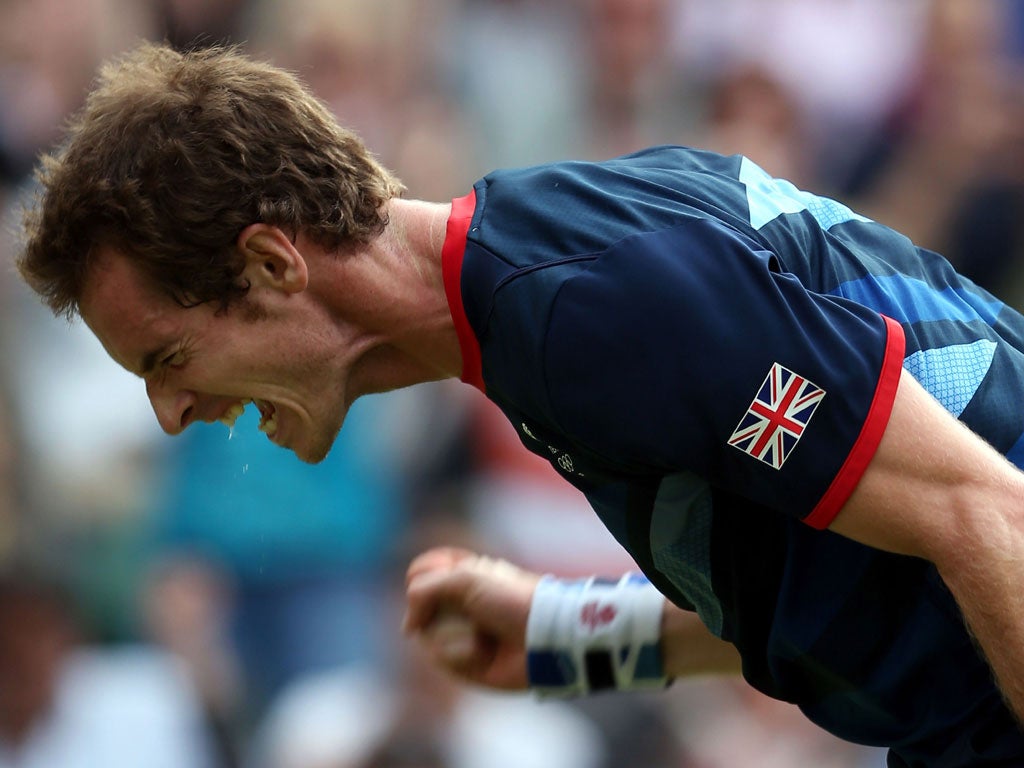Tennis: Andy Murray to face Roger Federer in the London 2012 final on the back of some of the best tennis of his career

Your support helps us to tell the story
From reproductive rights to climate change to Big Tech, The Independent is on the ground when the story is developing. Whether it's investigating the financials of Elon Musk's pro-Trump PAC or producing our latest documentary, 'The A Word', which shines a light on the American women fighting for reproductive rights, we know how important it is to parse out the facts from the messaging.
At such a critical moment in US history, we need reporters on the ground. Your donation allows us to keep sending journalists to speak to both sides of the story.
The Independent is trusted by Americans across the entire political spectrum. And unlike many other quality news outlets, we choose not to lock Americans out of our reporting and analysis with paywalls. We believe quality journalism should be available to everyone, paid for by those who can afford it.
Your support makes all the difference.The debate over the significance of an Olympic gold medal compared with a Grand Slam title will continue, but Andy Murray says that victory over Roger Federer in today’s men’s singles final here at the All England Club would be “right up there with anything else that I could achieve in tennis”.
Murray, who will also play for a gold medal alongside Laura Robson in the mixed doubles, has been fired-up like never before over the last week. Relishing the patriotic fervour of the crowd, who have been appreciably more vocal than the traditional Wimbledon public, the 25-year-old Scot has responded with some of the best tennis of his career. Having been criticised in the past for being too passive on court, he has played with admirable aggression throughout.
The world No 4 described his semi-final victory over Novak Djokovic as one of the biggest of his career. “It was one of the most emotional I've been after a match,” he added. “You don't see me smiling that much normally. All the volunteers and staff were just so pumped, so happy afterwards. Then there were all the people that came to watch and hung around outside afterwards. It's so different to what we normally experience in tennis.”
Now Murray faces Federer, who has inflicted three of the Scot’s four defeats in Grand Slam finals, most recently at Wimbledon four weeks ago. “I don’t think I did much wrong in that final,” Murray said. “It was just a couple of certain patterns of play that maybe I could have done a little bit more. They were working at the beginning of the match but I didn’t do as much in the third and fourth sets.”
Murray said the support from the public after Wimbledon had helped him to refocus. “That made me want to get on the practice court and get in the gym again,” he said. “Normally after I lost tough matches it has taken me a good few weeks or months before I wanted to get my head back in the gym or on the practice court.”
The Scot had a lengthy de-brief after Wimbledon with his coach, Ivan Lendl, who has since been back home in the United States. “It’s all about going forward,” Murray said. “I can’t change the Wimbledon final. That week afterwards I needed to think about it a bit, learn from it and get over it. This is a huge tournament so I needed to get over it quickly and move on.”
Murray has been following other Olympic sports on television in the locker room or back home in the evenings. He said the performances of other members of the British team like the gold-winning oarswoman, Katherine Grainger, a fellow Scot, had given him extra motivation.
As a sportsman who, like Grainger, knows what it is like to fall just short on a number of occasions, did Murray think he would feel a similar sense of elation if he finally lands a major prize?
“It’s happened a lot in sport, when it’s taken a long time to get that first breakthrough,” Murray said. “Guys like Goran Ivanisevic [who won Wimbledon at 29], stories like that, are motivational. They do happen. As long as you work hard and keep believing, you’ll get your chance.”
Murray will also seek a gold in partnership with Robson in the mixed doubles final tomorrow afternoon after the Britons won two matches in champions’ tie-breaks. They won their quarter-final against the Australians Lleyton Hewitt and Sam Stosur 6-3, 3-6, 10-8 and then beat the Germans Christopher Kas and Sabine Lisicki 6-1, 6-7, 10-7 in the semi-finals. In tomorrow’s gold medal match they will play the winner of the second semi-final between the Americans Mike Bryan and Lisa Raymond and the Belarusians Maxi Mirnyi and Victoria Azarenka.
Asked whether winning an Olympic gold would beat winning a Grand Slam title, Murray said: “It's impossible to say because I've never won a Slam before and I haven't won a gold medal before. But winning a silver medal at least feels really good. And losing in the final of a Grand Slam felt terrible.”
Join our commenting forum
Join thought-provoking conversations, follow other Independent readers and see their replies
Comments